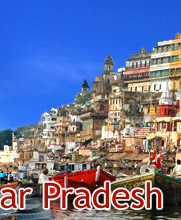 Lord
Buddha was born in Lumbini, in southwestern Nepal, nearly twenty-five
hundred years ago. Since then, the city has always remained the focal
point of Buddhism. Today's Lumbini is a small sleepy town in the
southwestern Tarai plains of Nepal, where the ruins of the old city can
still be seen. The followers of both Hinyana and Mahayana sects of
Buddhism revere Lumbini. The restored garden and surroundings of Lumbini
have the remains of many of the ancient Stupas and monasteries. A large
stone pillar that is said to be erected by the Mauryan emperor Ashoka in
250 BC bears an inscription about the birth of the Buddha.
Lord
Buddha was born in Lumbini, in southwestern Nepal, nearly twenty-five
hundred years ago. Since then, the city has always remained the focal
point of Buddhism. Today's Lumbini is a small sleepy town in the
southwestern Tarai plains of Nepal, where the ruins of the old city can
still be seen. The followers of both Hinyana and Mahayana sects of
Buddhism revere Lumbini. The restored garden and surroundings of Lumbini
have the remains of many of the ancient Stupas and monasteries. A large
stone pillar that is said to be erected by the Mauryan emperor Ashoka in
250 BC bears an inscription about the birth of the Buddha. The most important attraction of Lumbini is the holy temple of Maya Devi. The temple has a stone sculpture of Maya Devi in labor pain. The image shows her holding the branch of a tree while Buddha is getting birth. The temple is very popular among the women having some or other fertility problem. The main complex have large stretches of Bo Tree plantations. This the same tree that is shown in the sculpture in the Maya Devi temple. Another variety of the same plant is known as Banyan; the same plant under which Buddha got enlightened. The Bo plantation and a newly planted forest nearby lend an air of tranquility to the surrounding. Lumbini is now being developed under the Master Plan of the Lumbini Development Trust, a non-governmental organization dedicated to the restoration of Lumbini and its development as a pilgrimage site.
Apart from its religious and historical significance, Lumbini offers cultural insights into the village life of southwestern Nepal. The must catch event is the weekly communal Bazaar. This bazaar is organized every Monday therefore try to coincide your visit with that. The weekly bazaar looks like the scene taken straight out of the Arabian fables. Villagers come from miles around to buy grains, spices, pottery, jewelry, saris and various other items. With colorful merchandise spread out under the Mango trees and the air perfumed with incense, the place looks like the ocean of humanity. You can buy souvenirs for your dear ones and side-by-side witness the local life in Lumbini.
After centuries of neglect from travelers, backpackers and archeologists, Lumbini is finally scaling the chart. Serious preservation work has only just been started and efforts are being done on the war footing to save this historical marvel.









